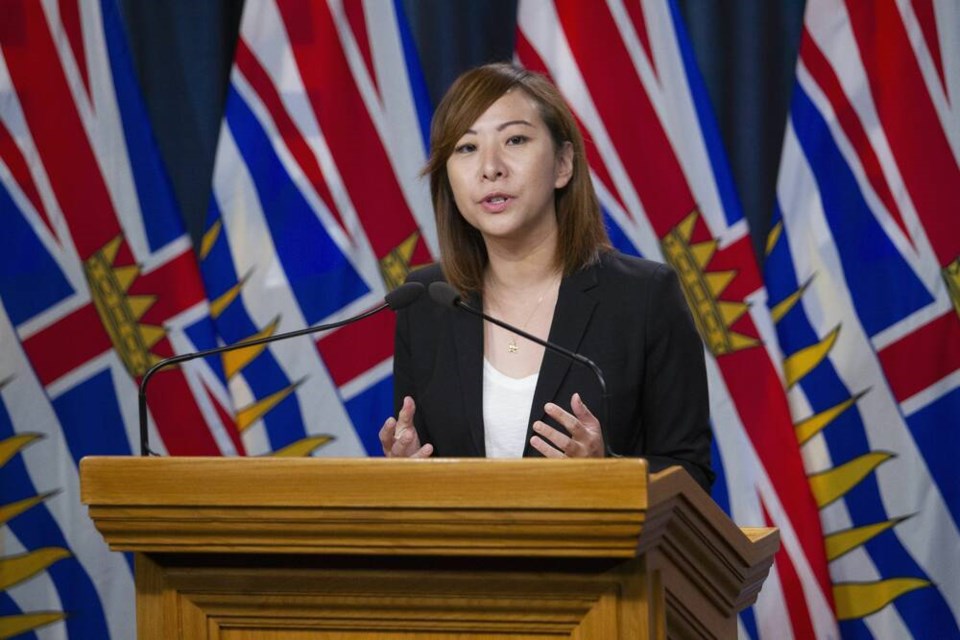B.C.’s NDP government must do more to ensure the legal system and family court system isn’t causing more harm to victims of gender-based violence, says Katrina Chen, B.C.’s former minister of state for child care, who went public last week with her personal story of facing ongoing trauma.
“I support this government 100 per cent but of course I want more action. We can’t just talk about it. We need to take concrete actions,” the 39-year-old single mother and NDP MLA for Burnaby-Lougheed told Postmedia News. “I would love to see government putting more focus on gender-based violence, which is the longest lasting human rights violation in this world.”
Chen is speaking publicly for the first time since she released a deeply personal statement last week revealing she’s been the victim of gender-based violence more than once in her life, which is why she asked Premier David Eby not to consider her for a cabinet post.
Chen, who co-chaired Eby’s leadership campaign and was praised for handling the complex roll out of the affordable child care program, was considered a sure bet for a promotion to a higher-profile ministry.
“I need time to focus on myself and my son,” Chen said in the statement.
Chen said she decided to go public on the National Day of Remembrance and Action on Violence Against Women in an attempt to break the stigma and silence around gender-based violence.
“There’s so many people that shared similar stories, but they just haven’t talked about it because there’s that sense of embarrassment, shame and worry about judgment all the time,” she said. “And I think that’s the barrier we need to break.”
Chen did not want to speak specifically of the violence she’s faced but spoke generally on the need for the government to make gender-based violence a larger priority.
Last week, two women were killed in separate homicides in Surrey and Coquitlam and another woman was injured after a targeted shooting in Maple Ridge, crimes being investigated by the Integrated Homicide Investigation Team.
Harpreet Kaur, 40, died after being stabbed several times in a home in Newton on Dec. 7. A 40-year-old man known to her was arrested at the scene but released the next day.
Angela Marie MacDougall, the executive director at the Vancouver-based Battered Women’s Support Services, said there’s been an escalation in violence against women since the start of the COVID-19 pandemic, particularly random violent attacks which have disproportionately impacted women and women of colour.
After reading the mandate letters Eby issued to his new cabinet last week, MacDougall was struck that the government is “not talking about gender-based violence. It’s not a policy priority.”
Kelli Paddon, who last week was appointed parliamentary secretary for gender equity, has been tasked in her mandate letter to work with the public safety minister to “develop an action plan to end gender-based violence, including minimum standards for sexual assault response, more training for police, Crown counsel and justices, and establishing core funding for sexual assault centres.”
Attorney General Niki Sharma’s mandate letter only includes one line about gender issues which is to work with Paddon to “address non-consensual disclosure of intimate images.”
The government’s focus so far, MacDougall said, has been increasing police resources to deal with sexualized violence instead of boosting funding to non-profits that provide key services such as free counselling to victims or their children.
MacDougall would like to see better legal aid resources in family law cases. The income threshold for legal aid is so low, many women don’t qualify but still can’t afford the hefty legal bills which often forces them into mediation with their abusers, she said.
Balbir Gurm, founder of the Network to Eliminate Violence in Relationships, said intimate partner violence is a pandemic which demands a heightened level of urgency from the government.
Gurm said she’d like to see B.C. follow Ontario’s lead and create an integrated court where a single judge can hear both criminal and family law cases when intimate partner violence is a factor.
“What you provide for victims is that they don’t have to tell their story over and over again,” Gurm said.
She’d also like to see mandatory intimate partner violence training for judges and lawyers dealing with such cases. Gurm hopes Sharma will make these reforms a priority.
Chen said she often confided in Sharma, a close friend, when she was triggered in the legislature by stories about gender-based violence which left her on the verge of tears.
The two met while running for municipal office in Metro Vancouver and, with kids born within months of each other, Chen said they bonded over the pressures of being a good mom while pursuing a demanding political career.
“Niki personally has been a friend who has supported me through this journey and she’ll be the best attorney general to work on this file,” Chen said.




